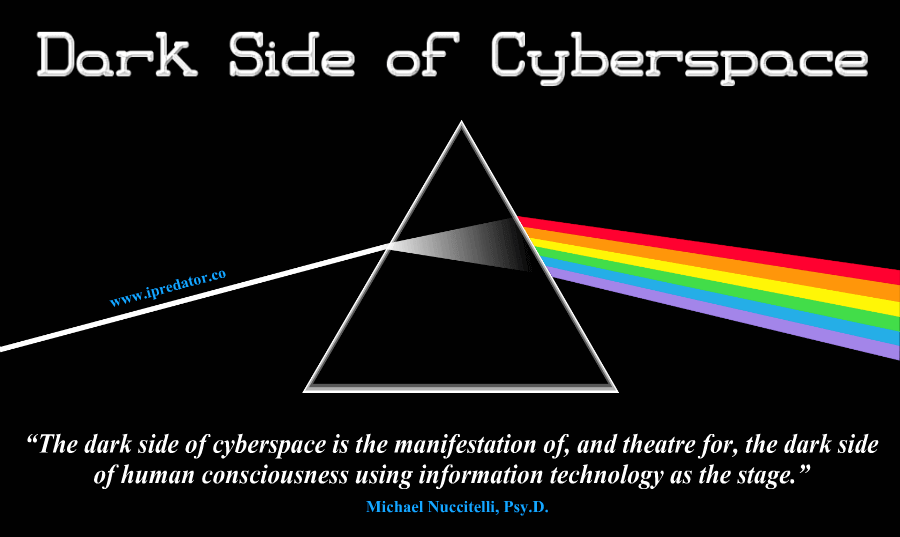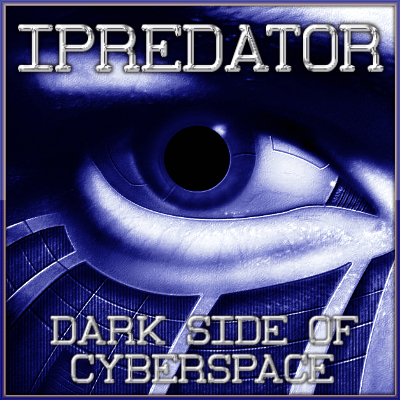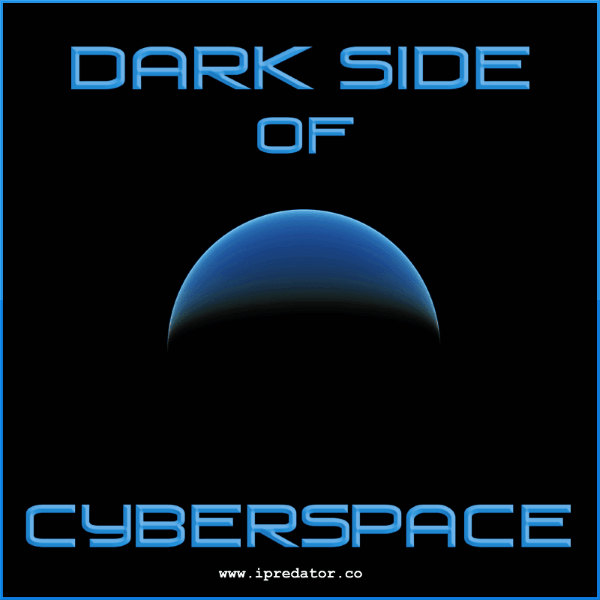Dark Side of Cyberspace
A Digital Realm for iPredators
by Michael Nuccitelli, Psy.D.
“Dark Side of Cyberspace is a metaphor and conceptual framework defining a virtual environmental realm that includes all criminal, deviant, deceptive, harmful and malevolent activities in the abstract universe of cyberspace. Whereas iPredator is a criminal, deviant and disturbed typology construct, Dark Side of Cyberspace also includes legal and illegal online activities, as well as, destructive and self-destructive online behaviors.” Michael Nuccitelli, Psy.D.
iPredator is a cybercriminal psychology and human consciousness concept. This conceptual framework began construction in 2009 and will inevitably be amended in time. Given this concept is new combined with having been constructed at the beginning of the Information Age, this writer has compiled for your reference some of the definitions he wrote in his mission to create a basic framework describing what he terms, the Dark Side of Cyberspace.
Welcome to the Information Age!
The Information Age is a societal paradigm and period beginning in the last quarter of the 20th century and presently thriving in the second decade of the 21st century. The Information Age is a stage in societal and technological development similar to the Industrial Revolution (1750-1942). The Information Age represents the evolution, emergence, consumption of and reliance upon Information and Communications Technology (ICT). In a mere four decades, ICT and its importance to humanity have led many to surmise that the planet and its human inhabitants are amidst an Information Revolution. Mobile device technology, telecommunications, social media and the abstract concept and artificial universe of cyberspace are just a few examples of humanities newest frontiers to interface with information.
The planet is experiencing a shift from traditional industry, born and bred during the Industrial Revolution, to an economy based on the creative and rapid manipulation of information. Just as the Industrial Revolution changed the lives of humanity, the Information Revolution is a societal shift rapidly changing social, economic and psychological conditions of the times. The Information Revolution marks another major turning point in history, following the Industrial Revolution and changing every aspect of daily life unlike ever before.
As this writer continues to work on iPredator, iPredator Bridge, Dark Side of Cyberspace and Dark Psychology [Hidden Realm of Human Consciousness], the question of etiology and modus operandi related to evil remains elusive at best. Thousands of hours have been spent formulating these concepts with the next three-four decades to inevitably follow. It is no wonder why the fields of psychology, sociology, physiology and all religious dogmas have merely scratched the surface.
Researching ancient history, recent historical events, great philosophers, cosmology, quantum theory and religious interpretations; combined with this writer’s past clinical and forensic experiences, has led to his novice conclusions defining evil called iPredator, iPredator Bridge and Dark Psychology. Humanity is the apparent apex of all sentient beings on Earth and one would think the location, roots and mechanisms of nourishment for evil would be mapped and supported by global consensus. Immediately and always called to mind is if other apex creatures, inhabiting planets throughout the universe, experience this same conundrum.
In relationship to history, it is of little human value, nor relevant to this writer’s pursuits, to castigate or pass judgment on if and how past atrocities occurred. If one does not subscribe to the accuracy of recorded history, then there are many other venues to consider. For example, if concluding that the Holocaust or similar historical mass genocides are nonsense and propaganda, then consider the American born profiles of Ted Bundy, Richard Ramirez, Jeffrey Dahmer and other prolific serial murderers as starting points. Whether attempting to succinctly interpret the motivations of Heinrich Himmler or Luis Garavito, the reality is that there resides within all humans a reservoir (aka, unconscious) from which malevolent desires are born, fed and coddled. These desires are fueled by progressively obsessive fantasies and a deviant attraction for power, control and domination.

Then comes along the historical and societal paradigm shift known as the Information Age, whereby technology and all internet enabled connected digital devices create the abstract and artificial illusory environment called cyberspace. It is within cyberspace, that this writer’s concepts of iPredator, iPredator Bridge and Dark Psychology merge into a proverbial “soup.” This writer has attempted to map this cyber convergence he has called 5PV. The primary difference between 5PV and all other criminal, deviant and abuse victimization models, used in its design, is the environment in which the interplay between predator and victim exchange occurs. This environment, which benefits iPredator, is cyberspace.
For the first time in human civilization, the abyss known as evil can be observed and witnessed with minimal effort within cyberspace. Unfortunately, what one sees with his or her eyes is not what is always accurately interpreted and imprinted within the unconscious. Information and Communications Technology (ICT) and the internet are brilliant designs of human invention. Cyberspace, the artificial environment accessed via electronic devices, is a remarkable engineering feat that has, and will continue to do so, change the very fabric of human consciousness and what it means to be community centric.
As an academic and philosophical disciple of Carl Jung, Alfred Adler, Robert Hare, Philip Zimbardo and Stanton Samenow, this writer seeks to rely upon their visions to one day define why cyberspace is causing a cultural disconnectedness. Unknown at present, cyberspace has built within its structure a method for circumventing a person’s capacity to practice humility, charity, self-preservation, and mutual respect for others. What this writer calls the “veil of anonymity” within cyberspace, a new perceptual dimension has been created. Cyberspace is an artificial world that can accelerate a person’s unconscious desire to engage in criminal, deviant and immoral acts, even if it is not part of their genetic or environmental heritage.
This proverbial “digital depravity factor” has already reared its ugly head evidenced by the rapid growth of cyberbullying, cyberstalking, online sexual predation, cybercrime and various other forms of online aggression and victimization. The explosion of online deception alone should cause communities to mobilize fearing an attack. The only iPredator typology not having come to fruition to date is cyber terrorism. Only time will tell if a major cyber terrorist event will target American soil within the next century. If humanity does not mobilize to implement a strategy stopping the societal disconnectedness this writer posits as growing, an optimal environment for cybercrime, online aggression and victimization are the inevitable outcomes. In relationship to the concept of Dark Side of Cyberspace, below are noteworthy definitions and concepts.

Information and Communications Technology [ICT]
Information and Communications Technology (ICT) is an umbrella term used to define any electronic or digital communication device or application used to obtain, exchange or disseminate information. ICT stresses the role of unified communications and the integration of telecommunications, which enable users to create, access, store, transmit and manipulate information. ICT consists of all forms of telecommunication, information technology, broadcast media, audio and video processing, transmission and network-based control and monitoring functions. ICT has rapidly become one of the basic building blocks of modern society and will become increasingly important as the Information Age matures.
Many industrialized nations now regard understanding ICT and mastering the basic skills and concepts of ICT is vital and now considered part of the core of education, alongside reading, writing and arithmetic. The importance of ICT to humanity lies upon a continuum of relevance ranging from minimal impact to vital requirement regarding an ICT user’s day to day activities. For some, ICT and the Internet are nothing more than tools of convenience for conducting their responsibilities. For others, their social, scholastic, business and/or financial affairs disclosed in cyberspace via ICT are crucial to their self-esteem, self-worth, success and perceptual world.
As ICT continues to expand at a feverish pace coupled with daily introductions of modern technology, ever-increasing obstacles will challenge humanity. Already, ICT users have been confronted by the ever-increasing detriments of having incredible amounts of information, which can be obtained, exchanged and spread at incredible speed. Another challenge, which includes the dark side of humanity, is the usage of ICT and cyberspace to harm others inflicting psychological, physical and/or societal damage. The construct iPredator, created by this writer, encapsulates these harmful typologies and is as follows:
“We are the first generation that will ask if we are being attacked by a human or a machine.” Michael Nuccitelli, Psy.D. (2016)
iPredator
iPredator: A person, group or nation who, directly or indirectly, engages in exploitation, victimization, coercion, stalking, theft or disparagement of others using Information and Communications Technology [ICT]. iPredators are driven by deviant fantasies, desires for power and control, retribution, religious fanaticism, political reprisal, psychiatric illness, perceptual distortions, peer acceptance or personal and financial gain. iPredators can be any age or gender and are not bound by economic status, race, religion or national heritage. iPredator is a global term used to distinguish anyone who engages in criminal, coercive, deviant or abusive behaviors using ICT. Central to the construct is the premise that Information Age criminals, deviants and the violently disturbed are psychopathological classifications new to humanity.
Whether the offender is a cyberstalker, cyber harasser, cybercriminal, online sexual predator, internet troll, cyber terrorist, cyberbully, online child pornography consumer/distributor or engaged in internet defamation or nefarious online deception, they fall within the scope of iPredator. The three criteria used to define an iPredator include:
- A self-awareness of causing harm to others, directly or indirectly, using ICT.
- The usage of ICT to obtain, exchange and deliver harmful information.
- A general understanding of Cyberstealth used to engage in criminal or deviant activities or to profile, identify, locate, stalk and engage a target.
Unlike human predators prior to the Information Age, iPredators rely upon the multitude of benefits offered by Information and Communications Technology [ICT]. These assistances include exchange of information over long distances, rapidity of information exchanged and the seemingly infinite access to data available. Malevolent in intent, iPredators habitually deceive others using ICT in the abstract and artificial electronic universe known as cyberspace. Therefore, as the internet naturally offers all ICT users anonymity, if they decide, iPredators actively design online profiles and diversionary tactics to remain undetected and untraceable.
Cyberstealth, a sub-tenet of iPredator, is a covert method by which iPredators attempt to establish and sustain complete anonymity while they engage in ICT activities planning their next assault, investigating innovative surveillance technologies or researching the social profiles of their next target. Concurrent with the concept of Cyberstealth is iPredator Victim Intuition [IVI], an iPredator’s IVI is their aptitude to sense a target’s ODDOR [Offline Distress Dictates Online Response], online & offline vulnerabilities, psychological weaknesses, technological limitations, increasing their success of a cyber-attack with minimal ramifications.

Online Psychopathy
Online Psychopathy is an Information Age criminology and human consciousness construct replacing classic pre-Information Age Psychopathy. Online Psychopathy is a characterlogical disorder describing anyone who skillfully uses cyberspace to exploit, control, subjugate and manipulate others. Driven by grandiosity or perversion, they experience no remorse or guilt from the devastation they cause others. Many Online Psychopaths do not break the law and live unscathed by law enforcement, fraternal organizations, religious institutions and legal systems. Just as classic psychopaths, Online Psychopaths are remorseless, without conscience, divisive and highly deceptive.
The difference between the pre-Information Age Psychopath and Online Psychopath is access to cyberspace, social media and Information and Communications Technology (ICT). The “veil of anonymity” cyberspace afforded to all online users allows the Online Psychopath to completely cloak their modus operandi, goals and nefarious online activities. Coupled with their grandiosity and distorted fantasy life, cyberspace and the internet acts as an accelerant to identifying and targeting unsuspecting, discouraged and vulnerable online users.
Disinformation
[aka, Online Deception]
Unlike classic deception used by traditional criminals and deviants, Disinformation [aka, Cyber Deception] completely relies on the anonymity and “veil of invisibility” available to all ICT users. The primary difference between Disinformation and Cyberstealth are the activities iPredators and ICT users engage in. In this writer’s construct, Cyberstealth is reserved for iPredators who actively plan a strategy that has criminal, deviant and harmful implications to targeted victims. Disinformation includes all forms of Cyberstealth, but also includes deceptive practices that do not have elements of crime, defiance or harm against others.
Disinformation does not require an ICT user to engage in nefarious, deviant or malevolent activities. Although all forms of deception are problematic, Disinformation can be as subtle of what many call a “white lie.” Another difference is when iPredators use Cyberstealth to hide their identity from victims. In general, iPredators use Cyberstealth when their actions involve illegal activities and hiding their identity is paramount to reduce being identified, apprehended and prosecuted. ICT users who evaluate their odds of being identified, develop tactics and strategies to minimize identification are motivated by criminal, deviant & harmful causes are iPredators using Cyberstealth.
“Given the Internet and ICT inherently affords everyone’s anonymity, Cyberstealth used by iPredators range from negligible to highly complex and multi-faceted.” Michael Nuccitelli, Psy.D. (2011)
iPredator Victim Intuition
iPredator Victim Intuition (IVI) is reserved for seasoned iPredators. IVI is the aptitude to sense a target’s online vulnerabilities, weaknesses and technological limitations increasing their success with minimal ramifications. iPredators, through practice and learning, develop a sense and/or skill of being able to experience an intuition to know what ICT user a successful target will be. Although there are other factors an iPredator uses in their repertoire of exhibiting IVI, it is highly recommended to learn the about IVI to reduce an online user’s chance of becoming an iPredator target.
An iPredator’s IVI acumen is based on practice, trial and error, understanding of human behavior and knowledge of Internet safety practices and ICT. Just as a locksmith has expertise at unlocking locks, an iPredator has expertise choosing a target they have concluded will not cause them to be identified, apprehended or punished. An iPredator’s IVI falls upon a continuum of dexterity whereby some iPredators are advanced in their IVI skills and other iPredators are novices. Whether the iPredator is advanced or novice in their IVI acumen, the fact that they engage in developing an IVI makes them a potentially dangerous ICT user.
Technology Serving Humans
vs.
Humans Serving Technology
Michael Nuccitelli, Psy.D.
Michael Nuccitelli, Psy.D. is a NYS licensed psychologist, cyberpsychology researcher and online safety educator. In 2009, Dr. Nuccitelli finalized his dark side of cyberspace concept called iPredator. Since 2010, he has advised those seeking information about cyberbullying, cyberstalking, cybercriminal minds, internet addiction and his Dark Psychology concept. By day Dr. Nuccitelli is a practicing psychologist, clinical supervisor and owner of MN Psychological Services, PLLC. After work and on the weekends, he volunteers helping online users who have been cyber-attacked. Dr. Nuccitelli’s is always available to interested parties and the media at no cost. This website and everything created by Dr. Nuccitelli is educational, free and public domain.

